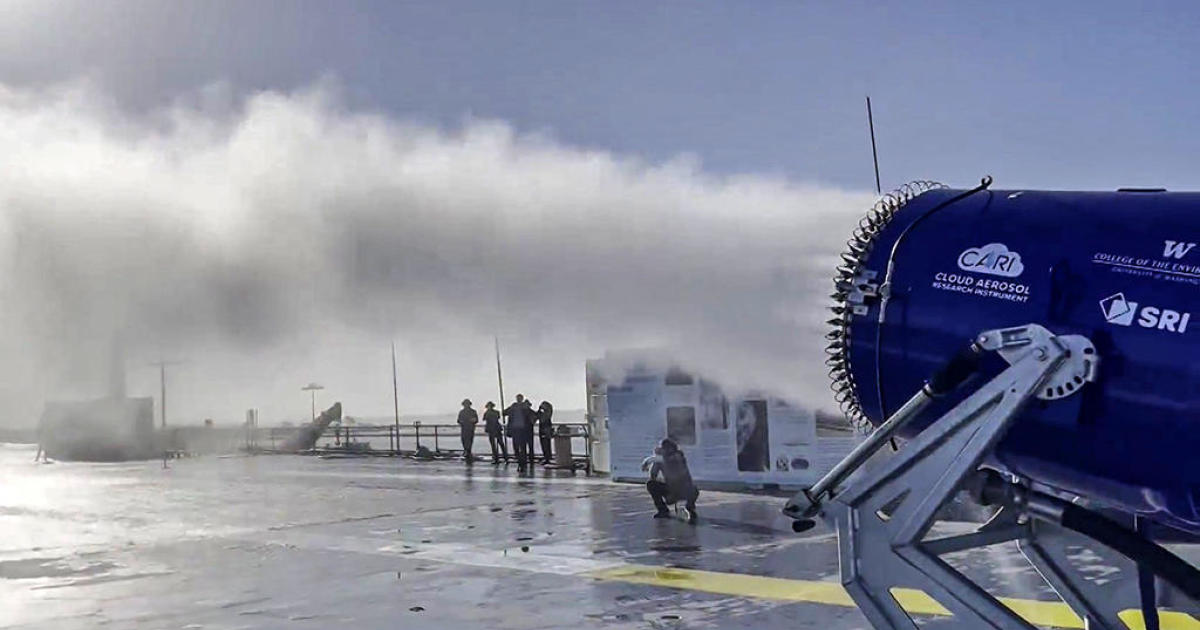Last month, the City of Alameda blocked scientists from continuing basic research into an experimental approach that may, one day, slow global warming.
The research was being done by atmospheric scientists from the University of Washington, and a nonprofit called SilverLining. SilverLining is funded by a consortium of philanthropic foundations and individual donors. Despite the researchers' credentials, the city council remained skeptical and voted unanimously to halt the work.
"We need to know more about this before you come to our city and start these experiments," concluded Alameda Mayor Marilyn Ezzy Ashcraft.
Marine cloud brightening is a scalable potentially majorly helpful mitigation strategy to keep us from going completely off the tipping points rails and this dip shit city council said you can't do research because you haven't done enough research
California is Not In My Back State, the State.
"No one has control over what people do in different parts of the world. There is no regulation in place. There's no global treaty in place about this technology that regulates this technology," remarked Lisa Dilling, an associate chief scientist with the Environmental Defense Fund.
At this point, she says, no one knows enough to safely deploy cloud brightening or any other form of solar radiation modification, also known as solar geoengineering.
"We absolutely think now is the time for doing research on the impacts of the technology," said Dilling.
The nonprofit fund announced it will finance the research, issuing grants to teams around the world in order to better inform governments, scientists and the public. The first grants will be issued after Oct. 1.
"We feel like we need to have strong scientific understanding before any decision is made about this," Dilling said. "That could be a decision to not to use the technology in the future. It could be decision to use the technology in the future."
This must have been cherry picked or taken out of context. No one could possibly be worried about this at the scales that are possible right now, they must be talking about future hypotheticals and not some salt sprayed off the deck of a boat.
https://en.wikipedia.org/wiki/Marine_cloud_brightening
The leading possible source of additional cloud condensation nuclei is salt from seawater, although there are others.
I wonder if this could present a possible solution to the huge amounts of highly concentrated brine that de-sal plants produce. AFAIK every de-sal plant creates a big death zone wherever it dumps the brine left over after it's pulled much of the water out of seawater. Maybe hte could, idk, spray the brine out over land, let it dry, collect it, and dump it in to the clouds where it'd end up back in the ocean dilute enough to no longer be a problem. Kill two canaries with one coal mine.
The comparison I most often see is that marine cloud brightening could potentially offset the loss of the aerosol masking effect from sea shipping companies cutting sulfur from their fuels. The aerosol masking effect is estimated to be somewhere between 0.5–1⁰ C which is now being realized. So Marine cloud brightening could, potentially at an astronomical scale, could offset that. Or we could put sulfur back in the fuels I guess lol
and then keep ramping it up so that we can continue burning fossil fuels until we're masking 2-3 c in warming and then there's an economic slowdown and we can't keep up the geoengineering and suddenly it's mask off on however many extra decades of warming got baked in meanwhile
the research is good, but geoengineering initiatives under capitalism are a death sentence
Nuclear power produces a lot of water vapour.
I feel like it is (or at least was) a no-brainer:
-
Draw in seawater
-
Run it through reverse osmosis if necessary under certain operating conditions
-
The waste brine from RO can be captured and processed, like you have mentioned
-
Use nuclear to provide for the baseload generation requirements, running an excess of power
-
Use renewables in whatever way is suitable, also run an excess of electricity generation
-
Capture the steam from the nuclear power plant and use this for clean water needs
-
Excess power can be used to produce clean water via a nearby desalination plant and it can be adjusted to balance the load, reducing production to manage load shedding (waste brine to be repurposed as mentioned above)
-
Desalinated water goes into the reactor for cooling purposes and gets recaptured on its way out
-
Brine to be repurposed as a potential global dimming/climate change reduction measure
Not to get all thermohaline on everyone but water vapour is a major greenhouse gas. I'm uncertain of whether nuclear power is a non-negligible source of water vapour (it probably is negligible) but if you have a better place to capture the waste heat to and/or to capture the water vapour in a way that doesn't significantly impact efficiency then why would you dump it into the atmosphere and make mother nature take yet-another one for the team, y'know?
Of course this would require a vast infrastructure project and it would require the right location but if you created a major reservoir in the right location you'd also be able to use it for hydroelectric power. Whether it would be on the scale of the Three Gorges or Hoover dams idk but having an additional source of energy via pumped storage (arriving via a scenic route) means that you'd potentially be able to manage unexpected spikes in the load in the electricity grid as well as helping to preserve aquifers and providing for water demands.
Note that this is also much more like solar(?)punk spitballing than it is anything approaching a legitimate engineer-developed project so there's no doubt that real world operating constraints would limit this, perhaps in a lot of ways, but it really does seem like it would a holy grail of meeting the demands of modern civilization:
Fresh water
Electricity generation
Multiple ways to store/use excess electricity and to balance the load, thus turning the problem of inconsistent renewable energy generation into a boon
The potential for additional energy-storage or energy-capture via harnessing the heat produced and by generating stored energy (e.g. producing hydrogen for fuel cells, ammonia for export either as liquid fuel or as a base for fertilizer, or using more exotic forms of energy storage.)
Feels like this would be perfect especially for places like Australia, some parts of South America, definitely South & West Asia, and of course Africa.
-





